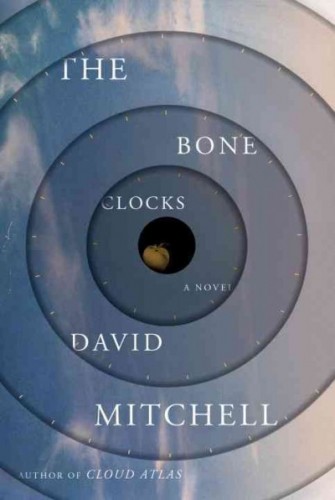 The Bone Clocks is Mitchell’s best yet. The characters are labyrinthine, loving and hating. The plot is ridiculously well done. This book seems to have oozed from the psyche like some bathybic mythocreature. Its prints will be on my mind for a long time.
The Bone Clocks is Mitchell’s best yet. The characters are labyrinthine, loving and hating. The plot is ridiculously well done. This book seems to have oozed from the psyche like some bathybic mythocreature. Its prints will be on my mind for a long time.
This is the blurb I sent in to our Random House reps after reading this book:
William O’Connor of The Daily Beast reviewed David Mitchell’s latest book writing: “One of the best novelists alive, Mitchell probably couldn’t write a truly bad book, but while his latest effort is always entertaining, nothing about it sticks with you.”
Several months away from the book, I have to disagree with Mr. O’Connor.
Instead of stiffly trying to refute point by point the aforementioned review I’m just going to tell you what I loved about this book, why I think it worked, and why I liked it better than Cloud Atlas.
Or, without shitting around, let’s just get to the heart of the problem. No one is going to contest David Mitchell’s ability to craft characters; If someone has a problem with this book, it’s most likely to do with the plot. To map out the plot of this book would be both annoying and pointless to readers. I’ll relate like this: where there seem to be holes, there are, and they are there for a purpose. And instead of the word holes, we should use the term voids. These voids create the cerebral and abstract situation necessary to capture the torrent that is the inner experience where the conscious and the unconscious meet. It’s essential to this book, and not an inconsistency. It’s like talking about a David Lynch film. If you need things to be reasonable, you probably just shouldn’t watch any Lynch films. Same thing with the other David. I personally found the story incredible, as opposed to credible, and thought it was spectacular. If I wanted to read a story about a middle aged man wasting away in a cubicle for three hundred pages I wouldn’t read David Mitchell. But, if you want to read something incredible, do it.
Most of The Bone Clocks detractors have a nostalgia complex. You loved Cloud Atlas so much that when you now read any of of his works it is accompanied by this sentimental longing for the past. Whenever you read about Timothy Cavendish or Luisa Rey in the new novel, you’re struck with that excitement only a long lost friend can conjure – feeling that disparate warmth reserved for the familiar, but you slowly come to realize Tim and Luisa have changed somehow, slightly, but enough to be untrustworthy, enough to be lulled out of your reverie in the clouds. Mitchell’s characters change just as they should, just like we do. For all of you experiencing this nostalgia complex, take one from Gregory House, M.D., “people never change” (at least not substantially).
Here is a subtle example of this complex from Mr. O’Connors piece:
And where are the clever insights so prevalent in Cloud Atlas, e.g., “If war’s first victim is truth, its second is clerical efficiency.” Or, “all revolutions are fantasy until they happen, then they are historical inevitabilities.”
O’Connor, not one paragraph before, writes:
The observations are witty, and Hershey’s self-destructive wallowing is as addictive as the best reality show. The next chapter, on the Horologist Marinus, allows Mitchell to dazzle us with his seemingly endless random knowledge of people and global history.
His willingness to praise Mitchell’s prose as witty and then immediately disavow it to ask ‘where is the wit we once saw in Cloud Atlas?’ is at once disturbing and telling. Despite their similar form, this latest novel is not supposed to be an iteration of the “masterpiece”. It’s an elegant, chaotic enrichment to the masterpiece that is being made.
If you have this complex, go see a psychoanalyst, because there is never going to be a Bone Atlas.
Written by Austen


Comments are closed.